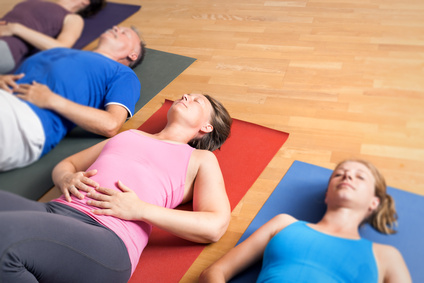Yoga and the 21st Century – Interview with TKV Desikachar May 1999
Question: How far do you think that yoga can contribute to maintaining good health in the coming century? Desikachar: It is now known that health is not just the absence of diseases coming from infections, etc. There are many illnesses for which medicine has no answer or knowledge of their origins.
People are also turning to other health systems which give them hope. Anything that can offer some solace is now being tried – there is aromatic therapy, hypnosis, magnetic therapy, etc.
In yoga we have this fundamental idea – anything that disturbs a person, including illness and disease, can be helped if we can act on the mind. What is so special about yoga is that it gives us a way to strengthen our mind. When the mind gets stronger, we can face illness and we feel healthier.
It has already been proved that yoga can help. Yoga is not medicine – it is concerned with the quality of life, attitudes to life, personal disciplines, and various other things which any system of medicine can accept. It will certainly have a role to play in every system of health care for times to come.
Question: In this field do you see the most important contribution from yoga being on a preventive or a curative level in the coming century? Desikachar: I think the most important contribution yoga can make in the field of health is the courage it can give to face illness, the strength we can find to cope with our ailments. The moment we have this strength, we have already been cured in a way.
That, I think, is a very significant contribution. This is at least what we see with the many different people who come to our yoga institution in India. Some of them have not received education, others are very cultivated, but whoever they are, when faced with illness, they generally feel discouraged.
After some time they have the courage to smile again, to take a walk, to climb some steps – which can be a big improvement… This happens because yoga identifies a power within them, a power which they didn’t think they had. It is not medicine, but it works.
Question: Are dietary restrictions a part of yoga? Desikachar: When we start yoga, we begin to look at ourselves. We notice what creates problems and what relieves these problems. Food can do both. If we notice that good food makes us feel better, we will start taking more care about our diet.
People who begin yoga practice start thinking about many things which they hadn’t considered before. Some even reflect on what colour the carpet on which they do their practice should be!
Obviously what we eat is an important consideration, but it is not something that we as yoga teachers insist on. Each person takes care of his or her own diet. As time goes by yoga makes us more aware of what we are doing and what we should be doing.
Question: Modern medicine has done wonders to improve many ailments, but the contemporary disease which we call stress seems to be difficult to handle for the medical world. Why is yoga practice effective for this field? Do you think it will remain so in the future? Desikachar: Our future life will be stressfull – there is no doubt about that. With all the comforts and conveniences we have, and all the opportunities which modern life gives us, we have more and more ambitions – this can only increase the stress level.
The question is how to cope with it? No outside force can do this for us – we have to look after it from within ourselves, using our own resources.
Yoga cannot prevent stress, but as I said earlier, yoga gives us access to our ressources, which are linked to the mind. In strengthening the mind, yoga enables us to develop a sort of cushion, an increased ability to withstand stress. This is the best way to cope with it. It’s like having a good shock absorber when driving a car on a bumpy road.
Through an understanding of what is at stake, linked to the practice of yoga, the force of our mental ressources are developed and we can handle stress better.
TKV Desikachar was in Narbonne, in the South of France, for a symposium on “Yoga and the XXIst Century” during May 1999. The purpose of the symposium was to consider the role of yoga for the coming century in the three fields of Health, Psychology and Spirituality.
With thanks to Paul Harvey – see also Relevance of Traditional Teaching, Yoga & Psycology




